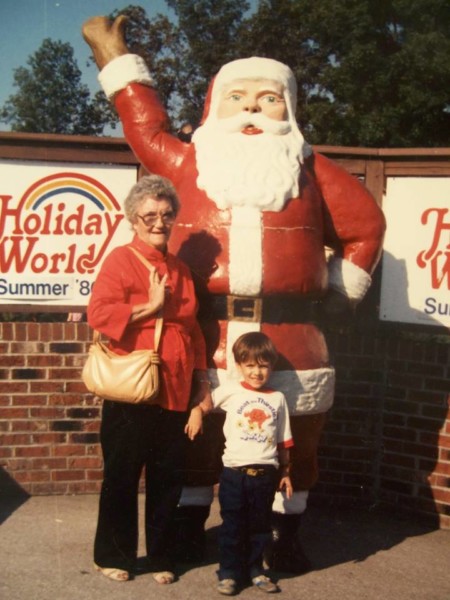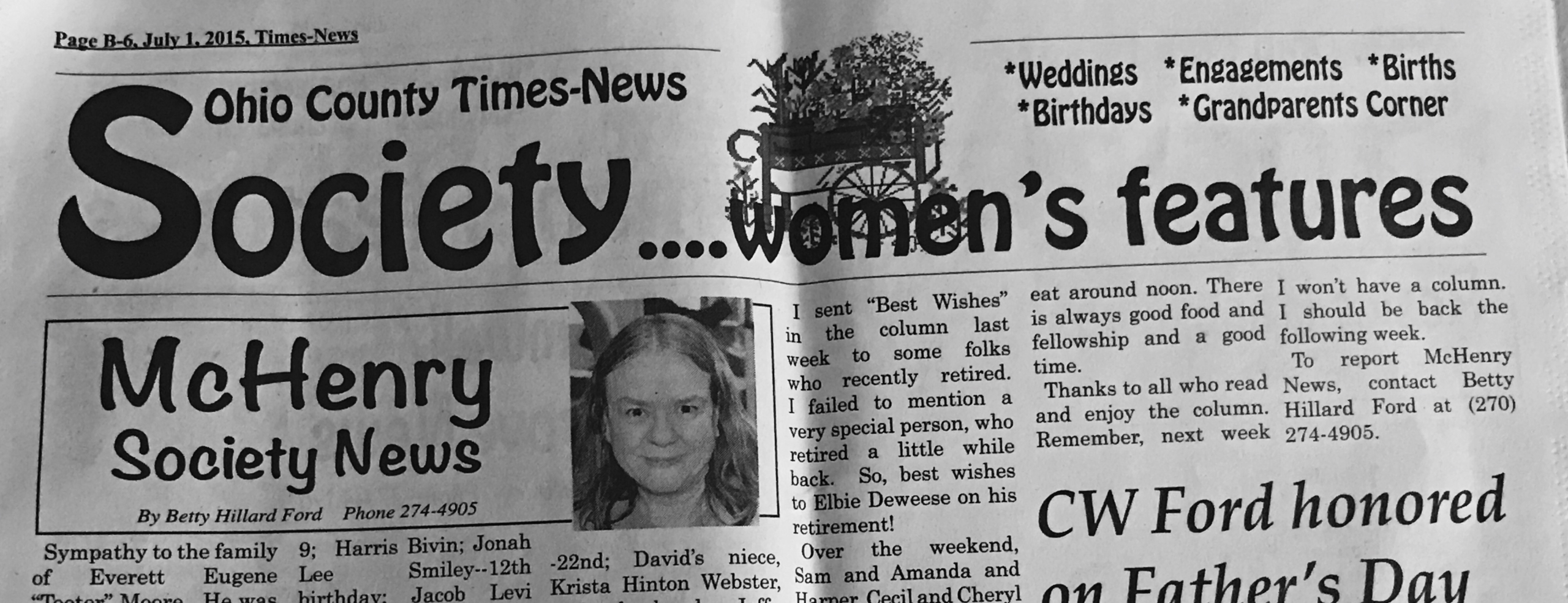Sign up for The Media Today, CJR’s daily newsletter.
I began my career in journalism at a young age, while I was still in school. But not J-school. Elementary school.
To be candid, it was a case of nepotism. I was handed the reigns, in 1995, to the McHenry News from my grandmother, Beulah Hillard.
The McHenry News, which ran in local weekly papers like the Ohio County Times-News, was part of a once-vibrant tradition in community journalism: the society columns of rural towns. From births and anniversaries to sicknesses and deaths, all the happenings of a town were published for readers to see, once a week, with a dutiful reminder to keep those in the community facing tragedy or illness in your prayers.
As the gathering places of many small towns have dwindled, and our online conversations are increasingly polarized, I keep thinking back to how important these columns were to my family, and many of those around me, in connecting us to the other few hundred who lived in our little town.
My hometown of McHenry, Kentucky is a city (officially, with an elected mayor) of 400-some citizens. The McHenry News appeared in Ohio County papers alongside the latest happenings from Rosine, Cromwell, Taffy, No Creek, and other small towns in rural Ohio County, Kentucky.
ICYMI: Dating app Tinder can be a tool for journalists
I’m not certain when Mammaw Beulah began the McHenry News. I found a column from August 1966 that didn’t bear her name but echoed her writing style. (News of out-of-state visitors—“Mr. and Mrs. Ike Ball, West Virginia, spent a week with Mrs. Ione Trail and other relatives.”) In September 1971, under the name of “Mrs. Hubert Hillard” (which she used for much of her at least three-decade run), she reported a bit of her own news: “Hillards Visit Santa Claus Land,” the theme park in Santa Claus, Indiana, now known as Holiday World.
People called Mammaw Beulah on a regular basis to report news they hoped to see in the next week’s edition. Or they stopped her at church, or at the store. Occasionally, they might have mailed her something. She handwrote the announcements into a column and mailed them to the weekly newspapers’ offices, where the column would run in future editions.
My mammaw, and all her colleagues, were the curators of these news columns—the Facebook feed of their time. Some, like Mammaw Beulah’s, were succinct and factual. Others were more conversational, interspersing inspirational quotes, Bible verses, and occasional editorializing. Often, submissions would be run “as is.” A 1985 Los Angeles Times piece quotes a column by Myrtle Shoupe in Hima, Kentucky. After a town resident died when his home caught fire, Shoupe wrote that it “could happen anybody but we don’t know what going to happen next but when we got to bed and go sleep we better be saved for we don’t know what going to happen in the night.”

Sam Ford and Mammaw Beulah.
When I was 12, and my grandmother was suffering from some health complications, she asked me to take over the family enterprise. Suddenly, I was a boy among giants, names I’d read in the paper my whole life—a cohort of fellow society column contributors, most of whom were women in their sixties and seventies. The steady stream of phone calls soon started on our phone line.
I enlisted my mom to take notes while I was at school. With her help, I became a fixture of the society news scene until my senior year of high school, when my mom—Betty Hillard Ford—went from silent partner to the official author of the McHenry News.
But the role left a lasting impression on me. I began working at rural newspaper offices. One of my first jobs was to receive the hand-written logs of these community contributors and translate them into print. (Some of them were quite the challenge to decipher.) I remained a writer at rural Kentucky newspapers until 2009.
I wasn’t the only young person running a society column. In 2006, Ben Ashby—16 or so at the time—took up the Centertown News. He ran it for five years, until growing up and moving around intervened, as it had with me.
ICYMI: Sharing a bed and a beat on opposite sides of the news spectrum
Ben, now 27, returned to publishing the Centertown News earlier this year, but with a twist. “So I did something new…well something I haven’t done in six years…I wrote a new column for the local paper,” Ashby wrote to on his Facebook page, commemorating the publishing of his first new column in February. “I also baked a chocolate chess pie. The recipe is in the column. The past year of politics has been hard on so many of my views about my hometown. Y’all it’s hard being a liberal in a small Kentucky town. I needed to fix that. I needed to restore my pride of place.” This year, Ben has published seven or so Centertown News pieces, telling stories of some of his favorite hometown people and of the past of this town of 300-some people.
My mom’s taken another path: the preservation of tradition. For the past few years, Betty Hillard Ford’s McHenry News has been the only society column you’ll find in the Ohio County Times-News, all year long. In addition to the time-honored traditions of the society column, she ends her piece every week with a special thanks to a dedicated reader. For instance, see the shout-out that ends this 2006 column available online: “This week, I would like to thank Hazel Blair (of Cincinnati, Ohio) for reading the column each week. Hazel is a daughter of the late A.J. and Lola Phelps Wakeland and was from here. We enjoy hearing from her every Christmas and I appreciate her kind words about the column.”
The McHenry News has been a printed space for many decades now for people who care about what was a dot on the map to others—a feeling of connection not just to those in the town you knew personally (and could “befriend” online), but to all those who felt a common connection.
Over the past 15 years, I’ve watched as those columns slowly began disappearing—as the curators of each of these small towns’ news fell ill or passed away, without anyone coming along behind them to take up the tradition, and as new communication platforms take on the functions these columns once had.
Cities like McHenry and Centertown all have city governments that no news outlet has the staff resources to give much coverage to. These towns have often lost the general stores, local diners, post offices, elementary schools, and other gathering places that once defined them. And the tone of polarization of communication in digital spaces do not necessarily lend themselves being the best venue for civic engagement at the most local of levels.
I hold on to how those columns engaged people like me, and Ben Ashby, at a young age; they made us feel a deep sense of place, and a lifelong connection to where we’re from.
Please keep these efforts in your prayers.
ICYMI: 10 podcasts to help you keep up with the news cycle
Has America ever needed a media defender more than now? Help us by joining CJR today.



